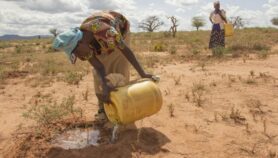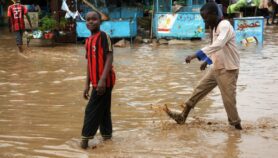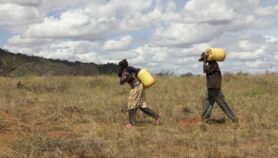Send to a friend
The details you provide on this page will not be used to send unsolicited email, and will not be sold to a 3rd party. See privacy policy.
Below is a round up of news from or about Sub-Saharan Africa for the period 25 February–12 March 2008.
Lay workers who visited the homes of people on antiretroviral drugs every week to dispense medication were responsible for a significant drop in mortality, according to research published in The Lancet. Homecare can overcome staffing shortages, poorly equipped clinics and long distances between people’s homes and health centres, the researchers say. More>>*
The digital gap between males and females in Africa — with women excluded from the benefits of information communication technology — is as damaging as the digital divide between Africa and the rest of the world, argues Wole Olatokun of the Africa Regional Centre for Information Science at the University of Ibadan, Nigeria. More>>
Around 4,000 smallholder farmers in the Asutifi district of Ghana are planting two million Musa — banana and plantain — seedlings developed using new micro-propagation techniques developed by the International Institute of Tropical Agriculture. Seeds were distributed by the University of Ghana, the Crop Research Institute and the Ministry of Agriculture, in a move to link scientific and market developments. More>>
Patients at Uganda’s largest hospitals, Mulago and Mbarara, have benefited from a shift towards free routine rapid HIV testing, as well as counselling for all patients and their family members, according to a study. Testing was accepted by 98 per cent of patients, the study reveals. Staff identified many undiagnosed HIV infections and HIV discordant couples. More>> ![]() [147kB]
[147kB]
An analysis of solid waste generation in Oyo city, Nigeria, found that 75 per cent of the waste in was organic in nature, with nearly 20 per cent animal dung. Reporting in Waste Management & Research, Abdel Ofun from Obafemi Awolowo University in Nigeria, estimates that up to 20 hectares of landfill will be needed if alternatives are not explored. More>>
The first systematic audit of the 82,000 people who took part in Malawi’s free anti-retroviral programme has found significant gaps in clinic databases. A comparison with data from the Ministry of Health showed an undercount of up to 12 per cent in the number of people on first-line drug combinations, amongst other inaccuracies. Simple incentives, such as certificates for good data, improved data quality. More>> ![]()
![]()
![]()
![]()
![]()
Researchers have shown that a new, more sensitive screening method for tuberculosis (TB) works for people whose immune systems do not react to the standard skin test, and in high-risk regions. Scientists at Fann and Le Dantec Hospitals in Dakar, Senegal, tracked 285 HIV-infected Senegalese adults with no visible signs of TB. More>>
The national laser centre of South Africa’s Council for Scientific and Industrial Research in Pretoria has signed a memorandum of understanding with Rhodes University in Grahamstown to develop promising cancer treatments. One project involves light-sensitive drugs, with testing performed on artificial living tissues based on human cells. More>>
Ahmadu Babgana of the African Union’s rural economy and agriculture unit has urged East African governments to develop capacity to intervene quickly in outbreaks of avian and human influenza. Speaking at a workshop in Ethiopia to outline a strategy, Babgana said bird flu poses "a huge risk" to the continent. More>> ![]()
![]()
![]()
African children with a sex development disorder — leading to ambiguous sexuality — are ridiculed and considered bewitched. In an article in the Journal of Child Health Care, psychiatric staff at Chris Hani Baragwanath hospital in Soweto, South Africa, describe the difficulties in deciding when, and whether, to subject children from large, lower socio-economic classes to surgery. More>>
Compiled by Christina Scott. Additional reporting by Fred Baffour Opoku.
If you would like to suggest a story for this news in brief, please contact the Africa News Editor Christina Scott ([email protected]).













